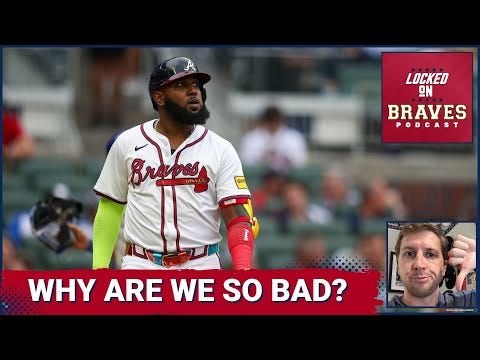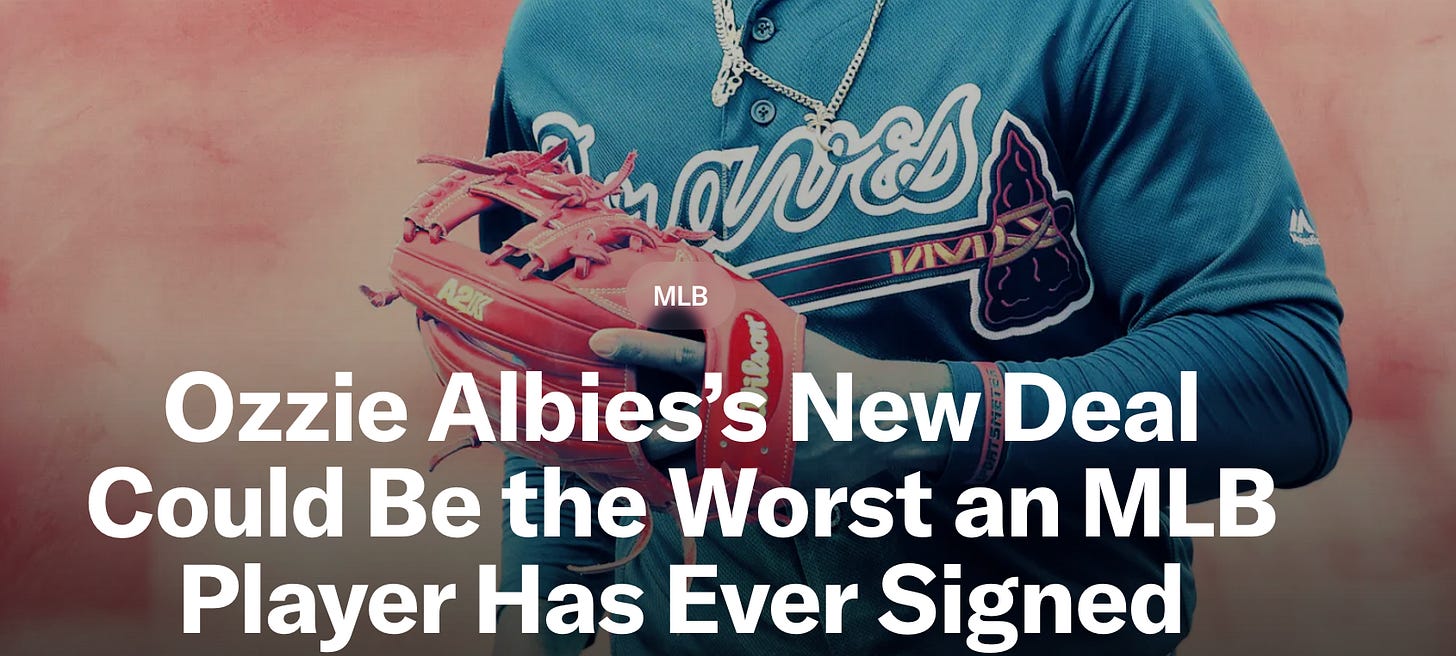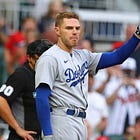There's No Perfect Way to Build a Baseball Team
Baseball Week Part 2!
It’s playoff time, so let’s talk about the Atlanta Braves, who are conspicuously absent from this year’s postseason. The Braves have been one of the best teams of the 2020s: They won the World Series in 2021, and won over 100 games in each of the next two seasons. They had elite talent, like 2023 MVP Ronald Acuña Jr. and 2024 Cy Young winner Chris Sale.
More than that, they were a model of a well-run organization because of their ability to sign so many young players to long-term extensions: Ronald Acuña Jr., Ozzie Albies, Spencer Strider, Michael Harris II., Austin Riley, Matt Olson, Sean Murphy — none of these guys ever made it to free agency. Some of the deals these players signed were so team-friendly that they were almost scandalous: When Albies signed a 7-year, $35 million extension in 2019, some people thought his agent ought to be investigated.
But reviews for Alex Anthopoulos, the Braves’ GM and President of Baseball Operations, were resoundingly positive. By locking guys into long-term deals before they reached free agency, he was able to keep a young core together throughout their primes. It also meant that the Braves did not have to get caught in bidding wars for their top talent, like Max Fried or Dansby Swanson, once they DID reach free agency. The team even let fan-favorite Freddie Freeman leave after their World Series championship, trading for a younger first baseman and signing HIM to a team-friendly deal rather than give Freeman the sixth guaranteed year he wanted.
It seemed like the Braves had found some crazy loophole in baseball’s Collective Bargaining Agreement. After all, it’s hard for these young players to turn down flashy eight- or nine-figure deals when they are only a year or two removed from the minors. Baseball players don’t reach free agency until they’ve been in the big leagues for six seasons — they don’t even reach arbitration until after Year 3. So all of the players who signed these deals got huge raises upon signing, even if their deals were all ultimately way below market.
Acuña, for example, signed a $100-million deal when he was just 21-years-old, fresh off his Rookie of the Year season in 2018, becoming the youngest player ever to sign a nine-figure contract. But had he turned the deal, he would have entered free agency as a 25-year-old, coming off an MVP season in 2023. For the sake of comparison, when Juan Soto entered free agency last year under similar circumstances, he signed a deal that was 7x bigger than Acuña’s. This happened so often that fans around baseball wondered why more teams didn’t copy the Braves’ strategy of locking down young talent.
Well, this season is why. Basically all of those young players the team extended regressed considerably. Albies had the worst OPS of his career. So did Harris. Riley missed 60 games and never looked right. Acuña missed the first half with an injury. Strider had the worst ERA of his career. The team got off to a slow start, and was never really in playoff contention after that.
And it’s funny how those deals all look different without the lens of team success. Harris, who hasn’t really been an elite player since his Rookie of the Year season in 2022, now makes about ten times as much as early MVP-candidate Pete Crow-Armstrong. Strider will make $20 million next year, and he was barely good enough to stay in their rotation this August. Things got so bad that earlier this season, there was even speculation that this once-brilliant strategy “created too comfortable an environment by awarding so many players extensions.”
To be clear, this is stupid! None of these contracts is really BAD — even Harris and Strider would probably earn more than they are currently getting on the open market. It’s just that no contract can get a team out of the uncertainty inherent to player performance. Baseball is a tricky game. Sometimes bad players have good seasons; sometimes good players have bad seasons. Time and chance happen to us all. It’s just as silly to blame these contracts for the players’ regression as it was to pretend that Anthoupolos was some genius for getting 22-year-olds to sign multi-million dollar contracts.
All the Braves have been doing this whole time was shifting risk from the players to themselves. Usually, a young player can’t negotiate a contract until they’ve been around for six years. So all the uncertainty inherent in baseball gets shouldered onto them for that time. If they play well, they can’t renegotiate their salary until they reach arbitration; if they get hurt or regress, they can’t guarantee that their employer won’t move on. Teams usually like to keep salaries as low as possible in this time, but teams have been buying out their top prospects’ arbitration years forever. Evan Longoria signed a contract six DAYS after the Rays called him up in 2008.
The Braves were just a little more aggressive with this strategy, willing to sacrifice those low rookie salaries for lower arbitration salaries and longer deals. But the risk and the uncertainty never really went away, and this season shows the downsides of the chances they took.
None of this is meant as a criticism of the Braves. I actually still like what they did: Keeping a core together longer is good for team stability, which is good for fans. It also speaks well of the organization that so many players commit to stay there throughout their primes. But it’s not like they cracked some code here. Players still need to play, and the guys in the front office are just simply never going to be as important as the players on the field.
A few years ago, when the Braves were dominating the NL East, some people were panicked about this Braves strategy. There were reports that the union didn’t like that so many star rookies were avoiding free agency (since star free agents help set the market for everyone else), and some fans acted like nobody could compete with Alex Anthopoulos. But I always thought this gave GMs too much credit. It’s a real symptom of management-brain to think that somehow the right contract or the savviest deal is going to mean more than whatever the players do on the field. In the end, it is always that labor that determines the outcome…



